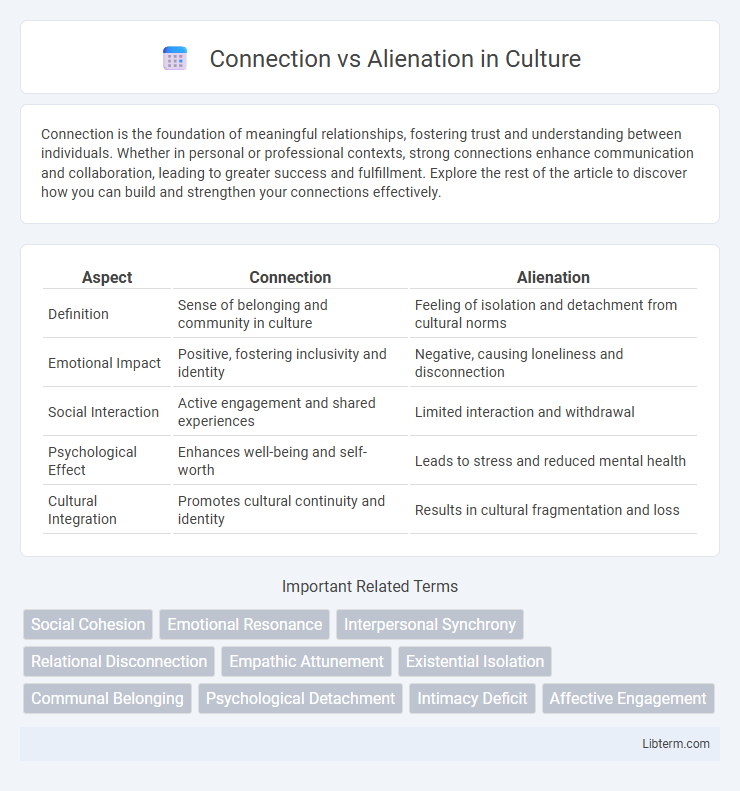Connection is the foundation of meaningful relationships, fostering trust and understanding between individuals. Whether in personal or professional contexts, strong connections enhance communication and collaboration, leading to greater success and fulfillment. Explore the rest of the article to discover how you can build and strengthen your connections effectively.
Table of Comparison
| Aspect | Connection | Alienation |
|---|---|---|
| Definition | Sense of belonging and community in culture | Feeling of isolation and detachment from cultural norms |
| Emotional Impact | Positive, fostering inclusivity and identity | Negative, causing loneliness and disconnection |
| Social Interaction | Active engagement and shared experiences | Limited interaction and withdrawal |
| Psychological Effect | Enhances well-being and self-worth | Leads to stress and reduced mental health |
| Cultural Integration | Promotes cultural continuity and identity | Results in cultural fragmentation and loss |
Understanding Connection and Alienation
Understanding connection involves recognizing the emotional and psychological bonds that foster trust, empathy, and a sense of belonging among individuals. Alienation, by contrast, refers to the experience of disconnection or estrangement in social, cultural, or personal contexts, often leading to feelings of isolation, powerlessness, and meaninglessness. Exploring these concepts reveals how social structures, communication patterns, and individual psychological factors contribute to the dynamics of inclusion and exclusion.
The Psychology Behind Human Bonds
Human bonds form the foundation of psychological wellbeing, with secure attachments promoting emotional stability and resilience. Connection fosters empathy, trust, and a sense of belonging, which are vital for mental health and social functioning. Alienation, marked by isolation and perceived social rejection, leads to increased stress, anxiety, and depressive symptoms.
Factors Leading to Alienation
Factors leading to alienation include social isolation, lack of meaningful relationships, and feelings of powerlessness in personal or professional environments. Economic insecurity and systemic inequalities often exacerbate alienation by limiting access to resources and opportunities for social participation. Psychological stress from unmet emotional needs and cultural disintegration further contribute to the sense of disconnection and alienation.
Social Media: Bridging or Widening the Gap?
Social media platforms have transformed communication by enabling instant global connections, yet they often contribute to feelings of alienation through curated portrayals of life and superficial interactions. Algorithms prioritize engagement, amplifying echo chambers and polarizing communities, which widens social divides despite the appearance of connection. Research shows increased social media use correlates with higher rates of loneliness and anxiety, indicating that digital networking can both bridge and deepen the gap in human relationships.
The Role of Empathy in Fostering Connection
Empathy plays a critical role in fostering connection by enabling individuals to understand and share the feelings of others, which reduces feelings of alienation. Neuroscientific research shows that empathetic interactions activate mirror neurons, enhancing emotional resonance and social bonding. Cultivating empathy through active listening and perspective-taking strengthens interpersonal relationships and builds inclusive communities.
Loneliness in a Connected World
Despite the unprecedented global connectivity facilitated by social media and digital communication platforms, many individuals experience profound loneliness and emotional alienation. Research in psychology highlights that the quality of interactions often diminishes online, leading to superficial connections that fail to fulfill the human need for meaningful social bonds. Studies also indicate that loneliness can have severe mental health impacts, including increased risk of depression and anxiety, underscoring the paradox of feeling isolated in an ostensibly connected world.
Cultural Influences on Connection and Alienation
Cultural influences shape the dynamics of connection and alienation by establishing shared values, norms, and communication styles that foster group cohesion or create social divides. Differences in cultural backgrounds can lead to misunderstandings or exclusion, amplifying feelings of alienation among individuals who do not conform to dominant cultural expectations. The interplay between cultural identity and social integration significantly impacts the extent to which people experience belonging or isolation within their communities.
Strategies to Overcome Alienation
Developing authentic relationships through active listening and empathy helps bridge the gap created by alienation, fostering a sense of belonging. Engaging in community activities and collaborative projects strengthens social bonds, reducing isolation and promoting meaningful connection. Cognitive reframing techniques encourage individuals to challenge negative perceptions that fuel alienation, enabling healthier interpersonal interactions.
Building Meaningful Relationships
Building meaningful relationships hinges on fostering genuine connection through empathy, active listening, and shared experiences that deepen mutual understanding and trust. Alienation emerges when barriers such as miscommunication, emotional distance, or lack of vulnerability prevent authentic interaction and create feelings of isolation. Prioritizing open, honest dialogue and emotional support cultivates enduring bonds that counteract alienation and enhance personal and social well-being.
The Future of Human Connection
Emerging technologies like virtual reality and AI-driven communication platforms are reshaping the future of human connection by enabling immersive, real-time interactions across vast distances. Despite these advancements, there is a growing concern that digital interfaces may contribute to emotional alienation, reducing the depth of face-to-face relationships. The future hinges on balancing technological innovation with cultivating genuine emotional bonds to prevent social fragmentation and foster inclusive communities.
Connection Infographic

 libterm.com
libterm.com